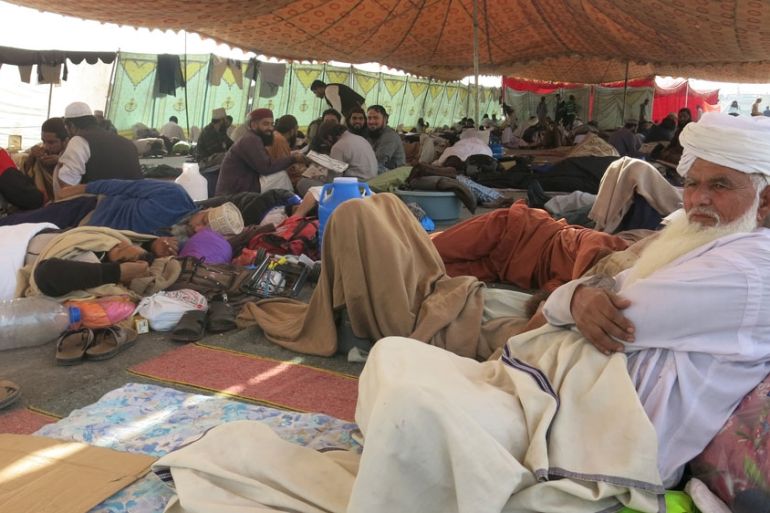Anti-blasphemy protesters block entrance to Islamabad
Conservative leader’s followers block Islamabad highway for sixth day, demanding strict adherence to blasphemy laws.

Islamabad, Pakistan – Hundreds of supporters of a conservative leader, many armed with sticks, continue to block the main entrance to the Pakistani capital, demanding the resignation of the federal law minister and a strict adherence to the country’s blasphemy laws.
Led by Khadim Hussain Rizvi, the leader of the Tehreek-e-Labbaik Pakistan political party, the protesters’ sit-in on a major highway entered its sixth day on Monday.
Keep reading
list of 4 itemsPhotos: Ukraine marks its third Easter at war
Israeli police detain Greek consul’s guard at Orthodox Easter ceremony
Gunman kills at least six in attack on mosque in Afghanistan’s Herat
The demonstrators, who number up to 2,000 at peak times, entered Islamabad last week, protesting against a slight change in the country’s electoral law, that saw what they term a softening of the state’s position against the Ahmadis.
Muslim parliamentarians in Pakistan are required to declare that they consider members of the Ahmadi sect to be non-Muslim, and their prophet to be “an imposter”. The electoral reform bill changed the wording of the declaration to “I believe” from “I solemnly swear”, which Rizvi and his supporters deemed unacceptable.
The bill was amended to return to the original wording on October 5, days after it was first passed.
Rizvi’s supporters, however, are demanding that federal Law Minister Zahid Hamid, whom they consider responsible for the change, be fired and face criminal charges. The government has repeatedly said that the change in wording was “a clerical error”.
The protest marks the latest challenge to the embattled PML-N government, which saw its leader Nawaz Sharif disqualified as prime minister in July and has since been fighting the decision on both the political and legal fronts.
Rizvi’s Tehreek-e-Labbaik Pakistan party has capitalised on the leader’s reputation as a staunch defender of the country’s strict blasphemy laws, which dictate a mandatory death penalty for those found to be insulting Islam’s Prophet. Recent years have seen an increasing expansion in what is widely considered “blasphemy”.
At least 73 people have been murdered over alleged blasphemy since 1990, according to an Al Jazeera tally.
The party managed to secure third place in a recent by-election in the eastern city of Lahore, the heartland of the ruling PML-N party. It also delivered a strong showing in another by-election in the northwestern city of Peshawar, bagging 7.6 percent of the vote.
Negotiations or force
Islamabad has been under virtual lockdown since the protesters entered the city, camping out at an intersection on a major highway leading into the city. The government has deployed as many as 1,800 police personnel to secure the entry and exit points near the protest, as well as blocking off access to the city’s government quarter using cargo containers.
“It is the government’s fault that the people are facing such an inconvenience,” said Faisal Javed, 23, who travelled from the town of Toba Tek Singh, 300km south of the capital, to attend the protest. “We will stay for as long as [Rizvi] is here.”
Members of the government and civic administration say they are focused on ending the standoff via negotiations, but that no clear resolution has been achieved.
“The government is clear on one thing: We will not accept any demand that is not according to either the constitution or the law,” Talal Chaudhry, minister of state at the interior ministry, told Al Jazeera.
Chaudhry said his government preferred not to use force against the protesters, but would not hesitate to do so if needed.
“If we want to thin them out or remove them from there, we can do it, but in Pakistan we are already fighting a war where religion is at the centre, and we do not want there to be any situation where the biggest religious sect [a part of which Rizvi represents] feels victimised,” he told Al Jazeera.
“Of course we cannot allow this to go on for an unlimited period,” said Mushtaq Ahmed, a senior civic administration official.
‘Hang them publicly’
The anger at the protest is palpable.
“Why are they calling these Qadianis our brothers and sisters?” demanded Azhar Rizvi, 22, who was manning the protesters’ barricades at the entrance to the sit-in, using a derogatory term for Ahmadis. “Every [Ahmadi] should be publicly hanged, so that it is in front of everyone!”
Nearby, a group of children shouted “Labbaik, labbaik ya Rasool Allah”, a slogan signifying solidarity with Islam’s Prophet, at pedestrians braving the barricades to cross into Islamabad on foot.
The sit-in site itself is covered with dozens of tents and rugs. A truck lined with speakers and a makeshift stage sits at the centre of the flyover the protesters have occupied, from which Rizvi often addresses the charged crowd.
On Monday morning, volunteers handed out cakes to protesters, who lined up in orderly queues to receive their breakfast.
![A volunteer hands out cakes to sit-in attendees who spent the night camped out on a major highway [Asad Hashim/Al Jazeera]](/wp-content/uploads/2017/11/82011e72d9794ed88dbfd916f3c094c9_18.jpeg)
“We are here only so that [Law Minister] Zahid Hamid is punished,” said Muhammad Abbas Anjum, 30, a seminary teacher who travelled 240km from Sheikhupura to attend the protest. “We only want him to be punished according to the law of the land.”
Even as he uttered the words, however, a cry went up among dozens of protesters around him. “Gustaakh-e-Rasool ki ek hi saza: Sar tan se judah, sar tan se judah!”
“There is only one punishment for those dishonouring the Prophet: to remove their heads from their bodies!”
Asad Hashim is Al Jazeera’s Web Correspondent in Pakistan. He tweets @AsadHashim.